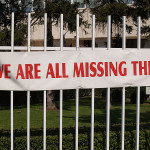by Alexis Payne
This past Monday, Deray McKesson, a leader in the Black Lives Matter movement (BLM), took over Yale’s Afro-American Cultural Center with an idea: “You are enough to start a movement. That is the story of Ferguson.” His audience was 200 potential movement-builders: Yale undergraduates, grad students, professors, and community members.
McKesson’s organizing and leadership experience brought him to Yale’s campus through the Divinity School’s Transformational Leadership Series. However, this particular talk—hosted by the Black Student Alliance at Yale (BSAY) and the Yale College Democrats—was open to the public and more focused on McKesson’s ideology and the BLM Movement.
Through his talk it became strikingly evident that BLM is revolutionary. Arising from a long history of institutionalized racism and systematic violence and drawing from the organizing efforts of past movements for Black Americans—its presence in the 21st century has given organizing a new and more democratic edge.
This democratic nature allows BLM to be more nuanced and intersectional. In other words, the movement exists as a non-monolithic entity, fully capable of encapsulating the efforts, ideas and initiatives of a wide range of people.
McKesson remarked, “In protest we say to the state, you are no longer worthy of my body and my soul. Either the state becomes worthy or we advocate the creation of a new state.” This seems to be one of the larger ideas of BLM.
According to McKesson— as long as the goal remains consistent and aims towards complete freedom for Black people, BLM can mean a plethora of different things which still works for the movement because, “there a lot of ways to do the work.”
With a movement this complicated, one is led to wonder what role BLM has at a place like Yale. McKesson reflected that there is power in people protesting in their own spaces and in transforming elitist institutions like Yale into environments that can nourish radical and free thoughts and ideas. He emphasized that the job of students is to wrestle with ideas in the classroom setting and put oneself in proximity to the work that is being done. McKesson advocated for awareness of the privilege that Yale students have and action based on that privilege.
The method(s) by which this freedom should be achieved are debated and wrestled with on a daily basis. Is the state at all redeemable? Or should we be advocating the creation of a new one? The absence of centralization in BLM allows for these questions and perspectives to exist together in the same movement.
While some might argue that this absence of centralization weakens the staying power of the movement, McKesson’s talk put forward a contrary narrative. Regardless, it was evident that there is something intrinsically powerful about the nature of BLM and the democratic basis of a movement of many leaders.



